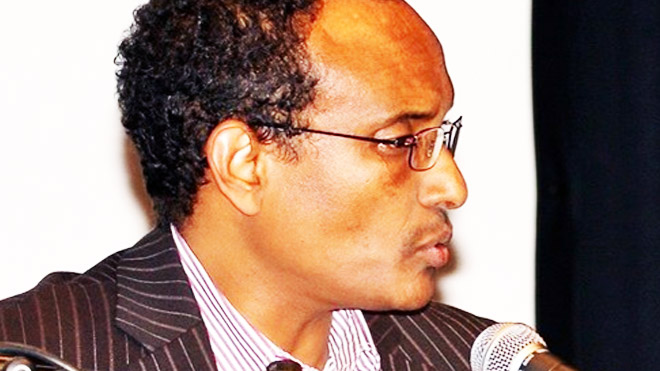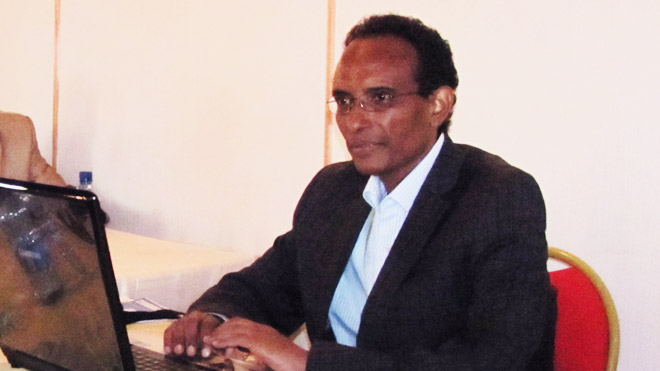Eritrea: Most Censored Country on Earth - Remembering Solomon Abera
Eritrea: Most Censored Country on Earth
Remembering Solomon Abera
Eritrea is the world's most censored country, according to a new report by Committee to Protect Journalists (CPJ), a media watchdog which was published today. The report also cites extreme measures taken by authorities in nine other countries, including North Korea, China and Saudi Arabia.
In order to highlight that quandary, Asmarino.com has decided to re-publish Solomon Abera’s story which appeared on our website eight years ago.

On the 18th of September 2001 Solomon got up early in the morning to go to work. A service bus picked him up and drove him to the news centre located at Forto (tsetserat) to meet what awaited him on that unforgettable day. Minutes before going on air the phone rang; it was a call from Naizghi Kiflu[1], the Minister of Information. The Minister handed Solomon a priority news item to read – a story that would change the course of journalism in Eritrea.
Many Eritreans remember Solomon Abera for reading an announcement that killed the nation’s independent press. As Solomon was reading what he was instructed to read, government agents were busy rounding up two groups of people - journalists who worked independently and government dissidents who called for democratic reforms - all of whom have disappeared in custody.
In 2005, tired of censorship and government intimidation, Solomon left the country to live in exile in Germany.
In exile, this veteran Dimtsi Hafash reporter/presenter/producer/commentator who worked for 14-year in Eritrea, turned into an activist of the degree; and he campaigned hard against the closure of independent media in Eritrea.
Solomon contributed to various discussions concerning the waywardness of the regime and inspired audiences in the diaspora to fight for their rights.
Unfortunately, Solomon passed away pre-maturely. He died of cancer on 1 Dec 2011 in a hospital in Frankfurt, Germany, leaving behind a wife and two children.
Eighteen years ago the fledgling free press died in Eritrea ushering in total uncertainty by disfiguring normalcy and causing unimaginable forfeitures to the country’s social, political and economic capital.
Before he passed away, Solomon reflected on the day that changed not only his life and that of his colleagues, but also the country. Here is an edited version of his story.
That Very Day
A Journalist’s Account of what Transpired on 18 Sep 2001
Written by Solomon Abera
18 Sep 2009

A journalist has the obligation to conduct proper research, expose hidden government secrets and present the findings to the wider public. Whatever happens to the journalist becomes part of him/her and of course, the country’s history; and here is what happened to me on ‘That very Day!’
Having spent the weekend covering sports events, my broadcast was going on air on Monday morning. My programme was called ‘The Sports Echo’. Every now and then I worked as a news reader. The news team and I worked very hard to a point of exhaustion.
It was the 18th of September 2001, the third consecutive Tuesday that I was summoned to do another shift as the newsreader. I got up early and waited for the service bus to arrive. We arrived at Endazena, my place of work, in time and I began my preparations conscientiously.
There were a few minutes left to 06:30 AM. I was ready with all the Tigrigna material handed to me to read; I was just waiting for the on-air light to come on.
The phone rang.
My colleague on the other side of office – across the double-glazed glass compartment – picked up the phone and seconds later made a hand-gesture for me to come out of the studio and talk to someone on the phone.
“This is crazy!” I thought, and I was not happy at all. “Why should I come out of the studio when I had only seconds left to go on-air?” I pondered. As I was contemplating what to do next my colleague signalled me again irritably to come out ASAP. I could see she was not happy at all herself.
“What sort of emergency is this?” I remember thinking. I am supposed to feel calm and contained before the broadcast starts and I did not feel at ease with what was happening at that very moment. I was reminded of the many occasions I was on duty during the Badme conflict (1998-2000) when things were gloomy and I had to pass on the story to the public.
I realized I had to step out of the studio and talk to the person on the line. I went out and picked up the phone.
“Hello… who am I talking to?” I asked.
“I am Naizghi. Who are you?” he retorted with a very unfriendly tone.
Naizghi? I thought quickly to make out who he was.
Yes, he was Naizghi Kiflu, the newly elected official assigned to the Ministry whom staff members have not met yet.
“Listen! Who are you?” he barked.
“It’s me Solomon.”
“Are you the newsreader on duty?”
“Yes.”
“Come to the head office as soon as possible”.
The music intro of Voice of the Masses was coming to an end and what was I supposed to do? What if I was asked why I left on zero hour?
“But Mr. Naizghi… on-air time is approaching and …” I couldn’t even finish the sentence…
“Just come here!”
“But wouldn’t it be better if I could at least start the programme and read the headlines first …” I pleaded.
“Are you stupid?” he said, “…there is no bigger news other than what I will be giving you. So, come now!”
There was nothing I could do. I just informed the duty technician to put some instrumental music on-air until I got back. The old studio of Voice of the Masses was located in building no.1 on the third floor; so I had to rush down the stairs (no elevator there) and up to the third floor in building no.2, where Beraki Ghebresellasie, the former minister, used to sit; and that office was later occupied by Zemhret Yohannes.
I just could not think straight while rushing down and then up the stairs. “Oh my god!” I thought while running. “Has another border conflict erupted?” I asked myself. “Didn’t they just sign a peace agreement … and don’t we have the peace keepers on our soil now?” I tried to console myself.
A few things came to mind. First I thought about the interviews the high level members of the party/government were giving to privately owned papers which had created a commotion everywhere. Their open letter to the president and party members was high up in people’s minds.
I also thought about the Naizghi Kiflu incident everybody was talking about in town. The shameful incident that took place in Shamrock Bar where Naizghi was literally clobbered by the president in front of witnesses. I also thought of a failed coup attempt.
It was a big confusion … my mind was racing … I had no idea what was happening out there!
There were Naizghi Kiflu, the director of TV Department, and, Ali Abdu, the acting Minister of Information, in the office.
In all that turmoil of that early morning drama, the rest of the department heads and members of staff of the Ministry were all at home. I was sure they had no idea of what was going on within the Ministry. All they could do was ask the technician why music was playing and where was the newsreader on duty.
I never met Naizghi in person in the past. After he looked me up and down, he said “are you the newsreader on duty?”
“Yes,” I said.
He did not look convinced.
“You listen now! The paper I am giving you is very important and you will have to read it with a vigorous voice!” he said. It felt as if he was telling me that I was not capable of presenting a story.
“You have to read it properly!” he said again. “With authority!” he repeated himself.
“OK,” I replied while wondering about the contents of the paper he had in his hand. I was more interested in that than his language; and I was on the verge of losing my patience with him. As he handed me the piece of paper, he said, “Let me hear you how you are going to read it!”
The anger I felt must have shown on my face – that I was being treated like a beginner by a man whom I never met before and who seemed to me had no clue of media matters. Fortunately, Ali Abdu came to my rescue. “You may not know him but he is the most experienced journalist we have here” he intervened.
“Is he?” asked Naizghi grouchily while he looked me up and down again. I took the piece of paper from his hand and left the office.
I was so impatient to read the contents of the paper I had in my hand while rushing down the stairs. I could see that it was all about silencing peoples’ voices. It was about shutting down independent newspapers and, indirectly, blocking stories on PFDJ activities that were beginning to unfold. PFDJ’s mismanagement of the country was slowly being revealed by those members of parliament who were giving interviews to the private newspapers. It was difficult to go on-air right away; I had to calm down and pull myself together.
They, Naizghi Kiflu and Ali Abdu, must have panicked when the broadcast was a bit delayed. They probably thought I disappeared with that piece of paper. They made another phone call to the studio and I had to explain why I needed to calm down before I go on-air. I delivered the story in Tigrinya by at 7:30. Then I went down to the coffee room at 8:00 am. Almost all staff members were there. They could not go in and work in their offices; they just sat there talking to each other in small groups.
One of them whispered, “Selie, while you were making the announcement about the shutting down of private papers, they were picking up people”.
“Like who?” I asked.
“Those members of government and the party who signed the open letter asking the president to hold cabinet and party meetings” he replied.
There was nothing to be done. As far as the government was concerned, we were not any better than those they picked up and it sent a clear message to all of us.
“You too will be next, if you misbehave!”
All was quiet. The independent papers were shut down. Voices were silenced and hearts were disconsolate. The whole situation just got from bad to worse.
Eritrea was not liberated to be silenced!
We will work for the rights of our people to have free press!
May God help our nation and our people!
Solomon Abera
September 18th 2009
EDITOR' Note:
Solomon Abera, a long-time friend of Asmarino, passed away on Dec 1, 2011. May his soul rest in peace!
[1] Naizghi Kiflu, the Minister who instructed Solomon to read the closure of independent media would later, in 2005, relocate to UK after clashing with President Isaias Afwerki. He died in London after he was denied burial in his homeland by the president.


![[AIM] Asmarino Independent Media](/images/logo/ailogo.png)
